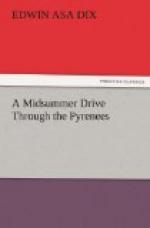“Five hours the dreadful battle had lasted at the walls, and now the storm of war went pouring into the town. The undaunted governor still disputed the victory for a short time with the aid of his barricades, but several hundreds of his men being cut off and taken in the hornwork, his garrison was so reduced that even to effect a retreat behind the line of defences which separated the town from the Monte Orgullo was difficult; the commanders of battalions were embarrassed for want of orders, and a thunder-storm, which came down from the mountains with unbounded fury immediately after the place was carried, added to the confusion of the fight.
“Many officers exerted themselves to preserve order, many men were well conducted; but the rapine and violence commenced by villains soon spread, the camp-followers crowded into the place, and the disorder continued until the flames, following the steps of the plunderer, put an end to his ferocity by destroying the whole town.”
* * * * *
It is beyond imagination, this sunny June afternoon, that the shining city about us has gasped in smoke and ruins, has been pierced with arrows unto death as was its patron saint of old; that this contentful droning of the shore and the street deepened once to the roar of war and rose to the shriek of suffering.
CHAPTER VI.
AN OLD SPANISH MINIATURE.
“When Charlemain with all his peerage
fell,
By Fontarabia.”
—MILTON.
The next day an indolent morning train draws us back to the frontier. The landscape is rather shadeless; “a Spaniard hates a tree.” It should be but a twenty-minute ride, and so, it being short at the longest, we do not have time to grudge the additional twenty consumed in “indolencing.” The time-table allowed for that, and so prepared us. It is when larger times are involved,—when a four-hour ride is inflated to eight, and an eight-hour trip to fifteen, as in going to Burgos,—that the corporate deliberateness of the Spanish railways ceases to be a curiosity, and becomes a crime.




